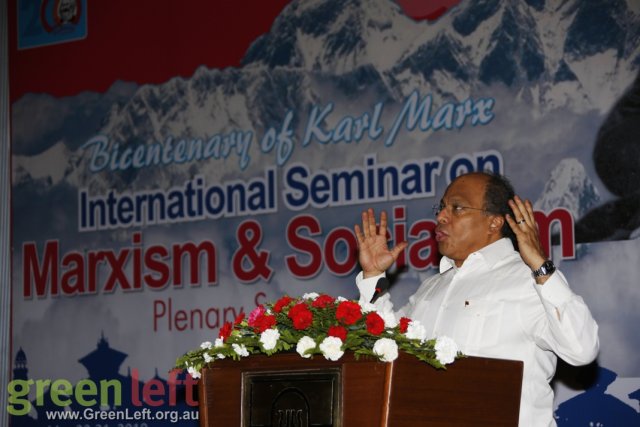
Hundreds of people attended an International Seminar on Marxism and Socialism in Kathmandu over May 30-31 to commemorate 200 years since the birth of Karl Marx. Representatives of 23 socialist parties from 17 countries attended.
The conference took place in the wake of the merger of the two largest left wing parties in the country: the Communist Party of Nepal (United Marxist Leninist) and the Nepal Communist Party (Maoist Centre). The unified Nepal Communist Party has two-thirds of the seats in the national parliament and a majority in six out of the seven provincial parliaments.
The prime minister, Nepal Communist Party co-chairperson KP Sharma Oli, addressed the conference highlighting the role of Marxism in shaping working-class and revolutionary struggles in the last 170 years.
“We do not imitate any model of revolution, movement, change or transformation,” he told the delegates. “Likewise we do not prescribe any model to others.”
The government is working under a slogan of “Prosperous Nepal and happy Nepali”. As one of the poorest countries in the region, the struggle against underdevelopment is a critical priority for the government.
Oli told the conference that “the path towards economic development is clear – effective and leading role of the government, economic policy guaranteeing meaningful and robust participation of the private sector, effective role of cooperatives and community sector, foreign investment in national priority areas, and different models of public-private partnerships”.
“We have embarked on an endogenous path towards peaceful attainment of socialism through the constitution [which came into effect in 2015 after an earlier struggle against the monarchy] and through legitimate means and people's mandate.”
Much discussion focused on achieving left unity in countries where the socialist movement is divided. Three Communist parties from India and four left parties from Bangladesh attended the conference.
Kavita Krishnan from the Communist Party of India (Marxist Leninist) told the conference that the divisions on the left are a result of genuine political differences and that the underlying debates need time to play out, rather than expecting unity to simply occur.
The conference concluded with a six point declaration that: hailed the ongoing relevance of Marxism; extended solidarity to all progressive and socialist struggles; and congratulated the Nepal Communist Party for its successes.
[Alex Bainbridge attended the International Seminar on Marxism and Socialism as a representative of the Socialist Alliance (Australia).]